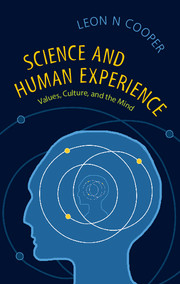Book contents
- Frontmatter
- Dedication
- Contents
- Preface
- Acknowledgement
- Part One Science and Society
- Part Two Thought and Consciousness
- 13 Source and Limits of Human Intellect
- 14 Neural Networks
- 15 Thought and Mental Experience: The Turing Test
- 16 Mind as Machine: Will We Rubbish Human Experience?
- 17 Memories and Memory: A Physicist's Approach to the Brain
- 18 On the Problem of Consciousness
- Part Three On the Nature and Limits of Science
- References
16 - Mind as Machine: Will We Rubbish Human Experience?
from Part Two - Thought and Consciousness
Published online by Cambridge University Press: 05 November 2014
- Frontmatter
- Dedication
- Contents
- Preface
- Acknowledgement
- Part One Science and Society
- Part Two Thought and Consciousness
- 13 Source and Limits of Human Intellect
- 14 Neural Networks
- 15 Thought and Mental Experience: The Turing Test
- 16 Mind as Machine: Will We Rubbish Human Experience?
- 17 Memories and Memory: A Physicist's Approach to the Brain
- 18 On the Problem of Consciousness
- Part Three On the Nature and Limits of Science
- References
Summary
Anxiety about robots and other forms of artificial intelligence precedes our ability to actually construct such entities. But does the ability to create thinking machines invalidate human experience? Will robots replace or supplant humans? Not if we can help it.
This essay is based on a talk originally given at the conference “Neural Networks and the Mind, Interdisciplinary Conference on Culture and Technology in the Twenty-First Century: Brain Research – An Intervention in Culture,” in Dusseldorf, Germany, 1993.
Recently, Hans Moravec discussed a transition from humans to what he calls a “Universal Robot.” The prospect that such a transition might be carried out inspires fear and raises many doubts. In this lecture, we analyze some of the problems that lie in the path of constructing robots or machines that think. In particular, we discuss the relation of Turing's famous test to a theory of mind and, drawing on the wisdom of Lessing and Goethe, explore possible implications for the meaning and worth of human experience.
In the program for the 1993 conference, “Neural Networks and the Mind,” in Dusseldorf, Germany we read:
A scientific revolution is in the air. Over the last 20 years there have been more scientific discoveries made concerning the human brain than in all of the previous 200 years.
[…]
- Type
- Chapter
- Information
- Science and Human ExperienceValues, Culture, and the Mind, pp. 124 - 131Publisher: Cambridge University PressPrint publication year: 2014



